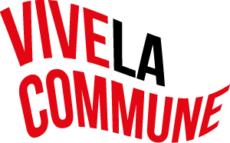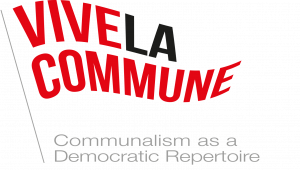
Expert Meeting: The Paris Commune in the Radical Imagination of the 1960s
3-4 November 2023
1848; 1871; 1917; 1918; 1936; 1956; 1968; 2011… these years of revolution and insurgency are often named in sequence. Whether the comparisons or connections that are drawn between them are always historically accurate, may of course be subject to academic debate. But it is evident that in activist discourses, political theory, and art such grand historical events have often been referenced and reinterpreted in order to tell a story about the present.
Among the events that shaped the political imagination of radical movements in the 1960s were the Kronstadt Rebellion, the November Revolution, the Spanish Civil War – and, most importantly, the Paris Commune of 1871 (Brown 2020; Cohn-Bendit 1969). Prominent theorists such as Henri Lefebvre (1965) and members of the Situationist International wrote extensively about the events of 1871 (Ross 1988). Many soixante-huitards claimed to have drawn inspiration from ‘the Commune’ or even sought to inscribe their own aspirations and experiences into this grand historical event (Abidor 2018; Ross 2002). Some retrospective accounts went as far as to interpret May ’68 as a ‘student commune’ (Morin 1968).
Although it is indeed debatable to what extent such comparisons hold water, they surely were politically productive (Lefebvre 1969). Whereas traditional Marxist and anarchist accounts primarily interpreted ‘the Commune’ in terms of class conflict, in the 1960s these events also acquired a more urban and/or quotidian character (Elden 2004). Rather than a general rehearsal for ‘1917’ or a revolution-to-come, ‘the Commune’ was increasingly read as an inherently meaningful and liberating experience. It also came to be re-imagined as a playful or festive event, with the Situationists famously calling it “the biggest festival of the nineteenth century” (Debord, Kotányi, Vaneigem 2006).
This expert meeting seeks to bring together an international and interdisciplinary group of researchers/authors with expertise in 1960s philosophy and political theory, the history of May ’68, and/or the Paris Commune and its historical impact. Our central aim is to discuss how ‘the Commune’ acquired new meanings and connotations in the radical 1960s. How does it relate to the ‘Right of the City’, ‘the quotidian,’ or the politics of play – and other ideas or practices that gained prominence in this period? How did ‘the Commune’ influence 1960s radical movements, such as Provo or the Situationist International? Why and how did soixante-huitards refer to the Paris Commune as an important source of inspiration? We also seek to draw lessons from both events – and from the specific ways in which one reinscribed the other – for our understanding of radical democracy today.
Key themes and questions that may be addressed during this workshop include:
- the Paris Commune of 1871 in 1960s radical philosophy (Guy Debord; Henri Lefebvre; Herbert Marcuse), art (Constant Nieuwenhuys; Michèle Bernstein), and activism (the Situationist International; Provo).
- the Paris Commune in 1960s Marxism and/or anarchism.
- the Paris Commune and (1960’s) feminism.
- references to the Paris Commune in the discourses, slogans and practices of May ’68.
- the idea of May ’68 as a ‘student commune’.
- communalism and the quotidian/everyday life; communal living and radical politics in the 1960s.
- the Paris Commune as an ‘urban social movement’ and/or as an expression of the ‘Right to the City’.
- Homo Ludens, the politics of play and the idea of ‘the commune’ as a festival.
- communalism and the politics of occupation and/or squatting.
- the politics of reinscription/reinterpretation of revolutionary events.

